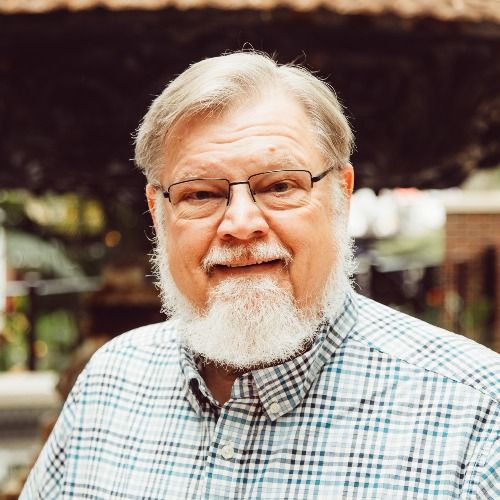Episode 933
Navigating Inner Conflict: A Progressive Interpretation of Romans
The "Daily Bible Refresh" is presented each day by Rev. Dr. Brad Miller who has a goal of speaking a bit of the bible into two million ears (one million people) in three years (2025-2028).
He is the author of "The A, B, C-1,2,3 Bible Study Guide" Free to you by clicking HERE.
Brad served as a local church pastor for forty years and has a background in radio and podcasting. Moreover, he is a life-long student of The Bible.
He believes in the words of Jesus that “scripture is fulfilled in your hearing” (Luke 4:21)
The "Daily Bible Refresh" is available seven days a week by 6:00 am ET. The episodes are no longer than ten minutes long and are...
- Understandable: A reading from the New Testament (usually the Gospel) selected from the Revised Common Lectionary using "The Message" translation.
- Relatable: You will have a couple of "points to ponder" from the text which will relate to your life
- Applicable: Every episode includes a way you can take action based on the reading
- A recommended resource to help you go deeper in biblical study and spiritual direction.
- A prayer for your day.
A companion resource to the Voice of God Daily Podcast is the “ABC Bible Study Guide” available by clicking HERE.
The "Daily Bible Refresh" is available every day at VoiceofGodDaily.com on Apple Podcasts, Spotify and all major podcast directories.
You can help Dr. Brad attain his goal of getting a bit of the bible into two million ears by subscribing to "Daily Bible Refresh" on Apple Podcasts, leaving a five-star rating, and writing a review. More importantly please share with your network of family and friends about the "Daily Bible Refresh".
Please make listening to the "Daily Bible Refresh" a part of your daily life.
Remember… “All scripture is God-breathed and useful”(2 Timothy 3:16)
The examination of inner conflict as articulated in the epistles of Paul provides a profound exploration of the human condition, particularly as it pertains to the struggle between intention and action. The discourse probes into the essence of Romans 7, where the Apostle Paul candidly expresses the dissonance that resides within him: the desire to do good juxtaposed against the propensity to succumb to sin. This inner turmoil is not merely a personal anecdote; rather, it becomes a reflection of the broader human experience. In a progressive interpretation, we recognize that such conflicts can transcend individual moral failings, pointing instead to systemic injustices that permeate our societies. Therefore, understanding this inner conflict invites us to engage with our complicity in larger societal issues, thus fostering a sense of communal responsibility and collective action in the pursuit of justice and liberation.
Moreover, the discussion emphasizes the necessity of embracing one’s humanity amidst the pursuit of perfection. Paul’s raw honesty serves as a critique of toxic positivity that often pervades religious communities. It is essential to acknowledge that transformation is not a linear journey marked by constant victories, but rather a complex process that requires patience, community support, and a commitment to growth. The emphasis on communal engagement over isolation underscores the belief that true personal development flourishes within a nurturing environment, where individuals can share their struggles and find encouragement.
The conclusion of the discourse highlights the importance of compassion, both towards oneself and others. The rhetorical question posed by Paul—“Who will rescue me?”—is answered not through individualistic salvation but via a collective effort towards liberation. This perspective aligns with progressive faith, which advocates for the idea that our interconnectedness is integral to overcoming the challenges we face. In this way, the episode culminates in a call to practice self-compassion and to actively engage with one’s community, thereby recognizing that the journey towards transformation is inherently relational and communal, grounded in love and mutual support.
The intricate dynamics of inner conflict and liberation are explored through a progressive interpretation of Romans 7, revealing the complexities of human behavior and moral struggles. This reading invites listeners to engage deeply with the text, as Paul articulates a profound discord between his intentions and actions. He acknowledges the spiritual nature of God's commands yet admits to a personal struggle with sin, which resonates with many who grapple with similar contradictions in their lives. The narrative unfolds to suggest that these struggles are not solely individual but reflect broader systemic issues, including societal injustices that entrap individuals despite their noble intentions.
In our analysis, we delve into three significant points that emerge from this discourse. First, the notion of moving beyond individual sin to recognize our roles within larger societal structures prompts a reevaluation of how we engage with issues such as systemic racism and economic inequality. By acknowledging our complicity, we can foster a more profound sense of responsibility towards collective action. Second, the conversation challenges the myth of perfection, urging us to embrace our humanity and the reality that transformation is a journey rather than a destination. The communal aspect of growth is emphasized, as individuals are encouraged to seek support and share their struggles within a safe space. Finally, the episode concludes with a call for compassion, advocating for a collective understanding that liberation is attainable when we support one another and connect beyond individualistic approaches.
In essence, this episode serves as a reminder that the path to transformation is fraught with challenges but is navigable through communal solidarity and self-compassion. We are invited to reflect on our own struggles, to acknowledge our imperfections, and to engage actively in our communities, thereby contributing to a collective journey of growth and liberation. The episode encapsulates the essence of progressive Christianity, inviting us to see our spiritual journeys as interconnected and deeply relational.
The discourse presented within the framework of Romans 7 invites a critical examination of the profound inner conflict experienced by individuals as they navigate the complexities of their moral landscapes. The Apostle Paul’s candid reflections on his struggles encapsulate the essence of humanity's ongoing battle between the desire for righteousness and the inescapable pull of sin. This tension is not a mere theological abstraction; it resonates with the lived experiences of countless individuals who find themselves ensnared in cycles of intention and failure. Through this lens, we explore the implications of personal sin in relation to systemic injustices that pervade our societies, thereby positioning individual struggles within a broader context of collective responsibility.
Throughout the episode, we delve into three pivotal themes that emerge from Paul's narrative. Firstly, the discussion emphasizes the necessity of transcending individual moral failings to recognize our participation in larger societal systems. This perspective encourages a deeper engagement with issues such as environmental degradation and economic disparity, urging individuals to confront their complicity in these injustices while fostering a commitment to collective action. Secondly, the notion of perfectionism is critically examined, as Paul's vulnerability serves as a counter-narrative to the pervasive culture of toxic positivity within religious spaces. Embracing our humanity and acknowledging the non-linear nature of transformation becomes vital in nurturing authentic spiritual growth. Lastly, we reflect on the concept of liberation through community, suggesting that the answer to Paul’s existential question lies not in individual salvation but in our interconnectedness and shared struggles.
The episode culminates with an actionable step, encouraging listeners to practice self-compassion when confronting the dissonance between their actions and values. By fostering an environment of grace and curiosity, individuals are invited to share their struggles within trusted communities, recognizing that the act of naming one's contradictions is a critical step towards transformation. This episode ultimately serves as a poignant reminder that our spiritual journeys are inherently relational, underscoring the importance of community support and collective engagement in the pursuit of justice and liberation.
Takeaways:
- The podcast emphasizes the significance of understanding inner conflict as a universal human experience, particularly in relation to spiritual struggles.
- It encourages listeners to recognize the interplay between individual moral challenges and systemic injustices in society, extending the conversation beyond personal failings.
- The discussion highlights the importance of embracing our humanity and understanding that growth and transformation are processes rather than finite achievements.
- The episode advocates for self-compassion, urging individuals to approach their contradictions with curiosity and share their struggles within supportive communities.
- It posits that true liberation comes not from individual actions alone, but through collective efforts toward social justice and community support.
- The episode concludes with a reminder that God's love is consistent and ever-renewing, reinforcing the theme of hope amidst personal and societal struggles.
Links referenced in this episode:
Transcript
Inner conflict and liberation.
Speaker A:A progressive reading of Romans 7, 14, 25 on the Daily Bible refresh with Dr.
Speaker A:Brad Miller.
Speaker A:Hello good people, my name is Dr.
Speaker A:Brad Miller here with you on the Daily Bible Refresh.
Speaker A:A daily reading from a progressive perspective of the New Testament.
Speaker A:We use a Revised Common Lectionary to give you the reading for this very day.
Speaker A:We're in year C of a three year cycle.
Speaker A:We are in the Pentecost season.
Speaker A:It's all brought to you by voiceofgoddaily.com that's the home of our daily Bible Study resource, the ABC 1, 2, 3 Bible study method.
Speaker A:We make the reading of the New Testament understandable.
Speaker A:We read from the message relatable.
Speaker A:We give you some points to ponder applicable.
Speaker A:We give you an action step to take.
Speaker A:We have a prayer.
Speaker A:We do all that in under 10 minutes.
Speaker A: lionaires a million people by: Speaker A:Please join us.
Speaker A:Here's our reading for the day from Romans 7, 14, 25.
Speaker A:From the message I can anticipate the response that is coming.
Speaker A:I know that all God's commands are spiritual, but I'm not.
Speaker A:Isn't this also your experience?
Speaker A:Yes.
Speaker A:I'm full of myself.
Speaker A:After all, I've spent a long time in sin's prison.
Speaker A:What I don't understand about myself is that I decide one way, but then I act another, doing things I absolutely despise.
Speaker A:So if I can't be trusted to figure out what is best for myself and then do it, it becomes obvious that God's command is necessary, but I need something more.
Speaker A:For I know the law, but I still can't keep it.
Speaker A:And if the power of sin within me keeps sabotaging my best intentions, I obviously need help.
Speaker A:I realize that I don't have what it takes.
Speaker A:I can will it, but I can't do it.
Speaker A:I decide to do good, but I don't really do it.
Speaker A:I decide to not do bad, but then I do it anyway.
Speaker A:My decisions, such as they are, don't result in actions.
Speaker A:Something has gone wrong deep within me and gets the better of me every time.
Speaker A:It happens so regularly that it is predictable.
Speaker A:The moment I decide to do good, sin is there to trip me up.
Speaker A:I truly delight in God's commands, but it's pretty obvious that not all of me joins in that delight.
Speaker A:Parts of me covertly rebel and just when I least expect it, they take charge.
Speaker A:I've tried everything and nothing helps.
Speaker A:I'm at the end of my rope, is There no one who can do anything for me.
Speaker A:Isn't that the real question?
Speaker A:The answer, thank God, is that Jesus Christ can and does.
Speaker A:He acted to set things right in this life of contradictions where I want to serve God with all my heart and mind, but I'm pulled by the influence of sin to do something totally different.
Speaker A:Wow.
Speaker A:This is a story for, for me and for so many of us where Paul is really honest about the inner conflict that's going on here, about the wrestling that takes place, the inner struggle and, and the transformation that that can lead to and, and what this means for our own journeys for growth and change.
Speaker A:Let me offer you, offer you some points to ponder.
Speaker A:The one.
Speaker A:The first one is about going beyond individual sin.
Speaker A:While Paul speaks of a personal struggle, progressive Christianity sees this text as more than just an individual moral failing.
Speaker A:The internal conflict often reflects our participation in systematic injustice, which we may recognize as systematic racism, environmental destruction or economic inequality as wrong, yet find ourselves somehow complicit in these systems in spite of good intentions.
Speaker A:The second point to ponder is the myth of perfect progress.
Speaker A:Paul's raw honesty about his struggles challenges toxic positivity and perfectionism in religious spaces.
Speaker A:This isn't about a moral failure, but about embracing our humanity and understanding that transformation is a process, not a destination.
Speaker A:Growth happens in community, not in isolation.
Speaker A:A third point, liberation through compassion.
Speaker A:When Paul asks who will rescue me, the answer isn't about individual salvation, but about connection to something larger than ourselves.
Speaker A:In progressive faith, this rescue comes through community support, collective action and the recognition that we're all bound together in the work of liberation.
Speaker A:Let's talk about an action step.
Speaker A:Practice self compassion.
Speaker A:While examining an area where your actions don't align with your values.
Speaker A:Give yourself some grace rather than self judgment.
Speaker A:Approach it with curiosity.
Speaker A:Share your struggle with a trusted friend or community member or perhaps your pastor.
Speaker A:Remember, naming our contradictions is the first step toward transformation.
Speaker A:We'll come back with a closing prayer in just a minute, but just a reminder that we've got a great resource just for you.
Speaker A:It's called the ABC 1, 2, 3 Bible Study Method.
Speaker A:It's just a point by point process to help you with your at home Bible study practices.
Speaker A:You pick it up and at our website voiceofgoddaily.com there's several places there on the website and in the show notes and you can do just that.
Speaker A:Let's pray.
Speaker A:Oh God, you're the divine source of grace.
Speaker A:When we feel torn between what we know is right and what we find ourselves doing, help us be gentle with ourselves when systems of oppression seem too big to change and we feel complicit despite our best intentions.
Speaker A:Remind us that transformation is a journey, not a destination.
Speaker A:Give us courage to name our struggles, wisdom to seek support when needed, and trust that your love holds us, even in our contradictions, in honesty and hope.
Speaker A:Amen.
Speaker A:Amen.
Speaker A:Well, it is great to be with you here on Voice of God Daily.
Speaker A:Thank you for joining me.
Speaker A:The Daily Bible refreshes completely listener supported.
Speaker A:If you'd like to support us financially, please head over to our website, voiceofgod daily.com scroll to the bottom of the page.
Speaker A:You'll find a great place there to leave your gift of any amount.
Speaker A: ionaires, a million people by: Speaker A:You're a part of it.
Speaker A:When you subscribe to the podcast and share it with others.
Speaker A:We're here every day.
Speaker A:We usually drop these episodes before 6am Eastern Time.
Speaker A:I'll see you again tomorrow.
Speaker A:My name is Dr.
Speaker A:Brad Miller.
Speaker A:Remember that God's loyal love doesn't run out.
Speaker A:His merciful love hasn't dried up, is created new every morning.



